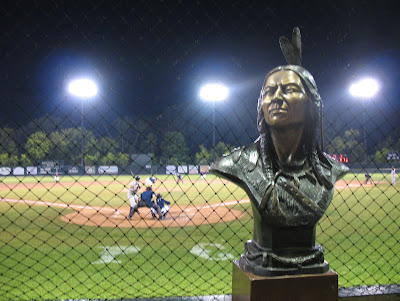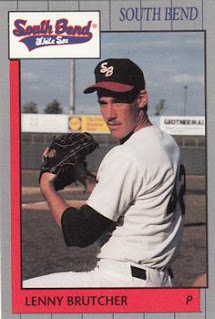Jim Neidlinger Interview Part 1: No Power Pitcher
 Middlebury College pitching coach Jim Neidlinger, end, on the bench at a recent game at Amherst College.
Middlebury College pitching coach Jim Neidlinger, end, on the bench at a recent game at Amherst College.Part 1: No Power Pitcher | Part 2: In The Majors | Part 3: Nothing More Exciting
 AMHERST, MA - Being a power pitcher is a good thing, former major league hurler Jim Neidlinger said recently, but not everybody can be a power pitcher.
AMHERST, MA - Being a power pitcher is a good thing, former major league hurler Jim Neidlinger said recently, but not everybody can be a power pitcher.The art and the fun in baseball, Neidlinger said, is with those non-power pitchers, the pitchers who can change speeds, cut their pitches or sink them.
"It's great to see a power arm," Neidlinger told The Greatest 21 Days in an interview last weekend, "But I have a lot of respect for the guys who are at that mid-range velocity and they continue to win, win, win, even at the higher levels."
It's a philosophy Neidlinger has been trying to pass on to younger pitchers for the past four years, serving as pitching coach at Middlebury College, in Vermont, and working under head coach Bob Smith.
It's also a philosophy he honed over 11 professional seasons as a pitcher in the Pirates, Dodgers, Twins and Cardinals organizations.
Far from a power pitcher himself, Neidlinger manipulated his pitches all the way to the majors, a 10-game look with the Dodgers for 1990. Those 10 games would also prove to be the extent of his big league career.
 Jim Neidlinger, right, before the game at Amherst College
Jim Neidlinger, right, before the game at Amherst CollegeAlong the way, Neidlinger learned the game and pitched well enough to sign his first professional contract, all without the benefit of his father being able to see it. His father Jim died when Neidlinger was 5, killed in a dune buggy accident.
But it was as a professional that Neidlinger met his wife Ann, as he played for AA Nashua. Soon married, she followed him up the ranks, but couldn't follow him on the biggest day of his professional career: his major league debut. She stayed behind at Albuquerque, 8.5 months pregnant with their first child.
They would soon reunite, with Neidlinger making it back for the big event, going straight from the Dodger Stadium mound to the airport to do it.
Neidlinger's career was also filled with missed opportunities, some on the part of the organization, missing its opportunity to see what Neidlinger could do at a higher level, others from Neidlinger himself, not capitalizing on previous hard-fought gains.
It all finally came to an end one day in 1994, with Neidlinger sitting in front of a AAA locker, realizing it was time to go. The clue: the game had become more like a job than anything.
His playing career over, Neidlinger turned to teaching kids the game, first at the University of Vermont, and now at Middlebury. He also instructs on the side.
 Pitching coach Jim Neidlinger, crouched, watches over Middlebury sophomore Mike Joseph during warm-ups at Amherst College.
Pitching coach Jim Neidlinger, crouched, watches over Middlebury sophomore Mike Joseph during warm-ups at Amherst College.Among the young pitchers he's teaching now is Middlebury sophomore Mike Joseph, a Pennsylvania product. The starter in game 1 of Middlebury's double-header with rival Amherst College April 9, Joseph went all seven innings of the shortened game. He gave up three earned runs on just four hits, changing his speeds along the way to a 8-3 Middlebury win.
After the game, Joseph told The Greatest 21 Days that Neidlinger's experience is definitely an asset. If something's wrong, Neidlinger knows how to work with pitchers to fix it.
Neidinger also doesn't give up on his pitchers, Joseph said. Joseph recalled struggling as a freshman, and some as a sophomore. Buy Neidlinger's stuck with him, helping him with his breaking ball when he needed it and keeping his mindset positive.
"That's something that was really helpful for me, to go out there and have confidence, even when I didn't really feel like I had my best stuff," Joseph said. "He would reinforce that. That was very helpful for me."
It was in the minors, Neidlinger said, that he learned what he knows now, learning it from the great baseball minds of his managers and coaches.
That career began in 1984, signed by the Pirates as a free agent out of junior college in his native California. He had opportunities to go to bigger schools, but instead chose the pros. He wasn't academically oriented, Neidlinger said, adding he was not at all like the players he's coaching now.
The offer from the Pirates scout, Neidlinger said, was his opportunity to start chasing his dream of playing professional baseball. So, at the age of 19, Neidlinger took the mound that first season for single-A Macon, going 9-8 with a 2.77 ERA.
It was in 1986, his third season, where Neidlinger said things started to click. He started to sink the ball a little, started to cut the ball a little, understanding off-speed pitches late in the count and learning how to pitch to contact.
"Next thing you know, I was going a lot deeper into ballgames and throwing less pitches," Neidlinger said.
 Jim Neidlinger behind the bench at Amherst College.
Jim Neidlinger behind the bench at Amherst College.It led directly to lower-hit ballgames, and one no-hit ballgame. The no-hitter, Neidlinger noted, came with some good fielding behind him and in Nashua's park, a pitchers park. But it was a no-hitter. "It was a very special moment," Neidlinger said. "No-hitters are hard to come-by."
Neidlinger would also get another no-hitter, though a rain-shortened, five-inning no-hitter years later at Albuquerque.
Back at Nashua in 1986, Neidlinger went 12-7 on the year, with a 2.42 ERA. It was a year that Neidlinger called magical and a year where there was talk he might get a September call-up. But the call-up didn't come that year. The next year, he didn't even move. It was back to AA for 1987. And again in 1988.
Neidlinger didn't understand it. He went 11-8 with a 3.96 ERA in 1987 at AA Harrisburg. He moved to a more relief role for 1988, posting a sub-3 ERA, getting a brief look at AAA Buffalo.
Still, it was nearly three full seasons stalled at AA.
"It was a difficult situation," Neidlinger recalled. "Live's going to deal you some setbacks, whether it be baseball, or just life lessons in general. Back then, I was very disappointed. 'Am I doing the right thing?' 'Why are they doing this to me?'"
"I felt that I did the right thing," Neidlinger added later, "as far as I just kept playing."
After 1988, and speaking with members of the Pirates organization about his future, he got a call, he'd been traded to the Dodgers.
"I got a new life when I got traded," Neidlinger said, "and that's all a player can really ask for."
That new life led to Neidlinger leaving AA behind for good. It also led him to the majors.
Part 2: In the Majors
Part 1: No Power Pitcher | Part 2: In The Majors | Part 3: Nothing More Exciting






